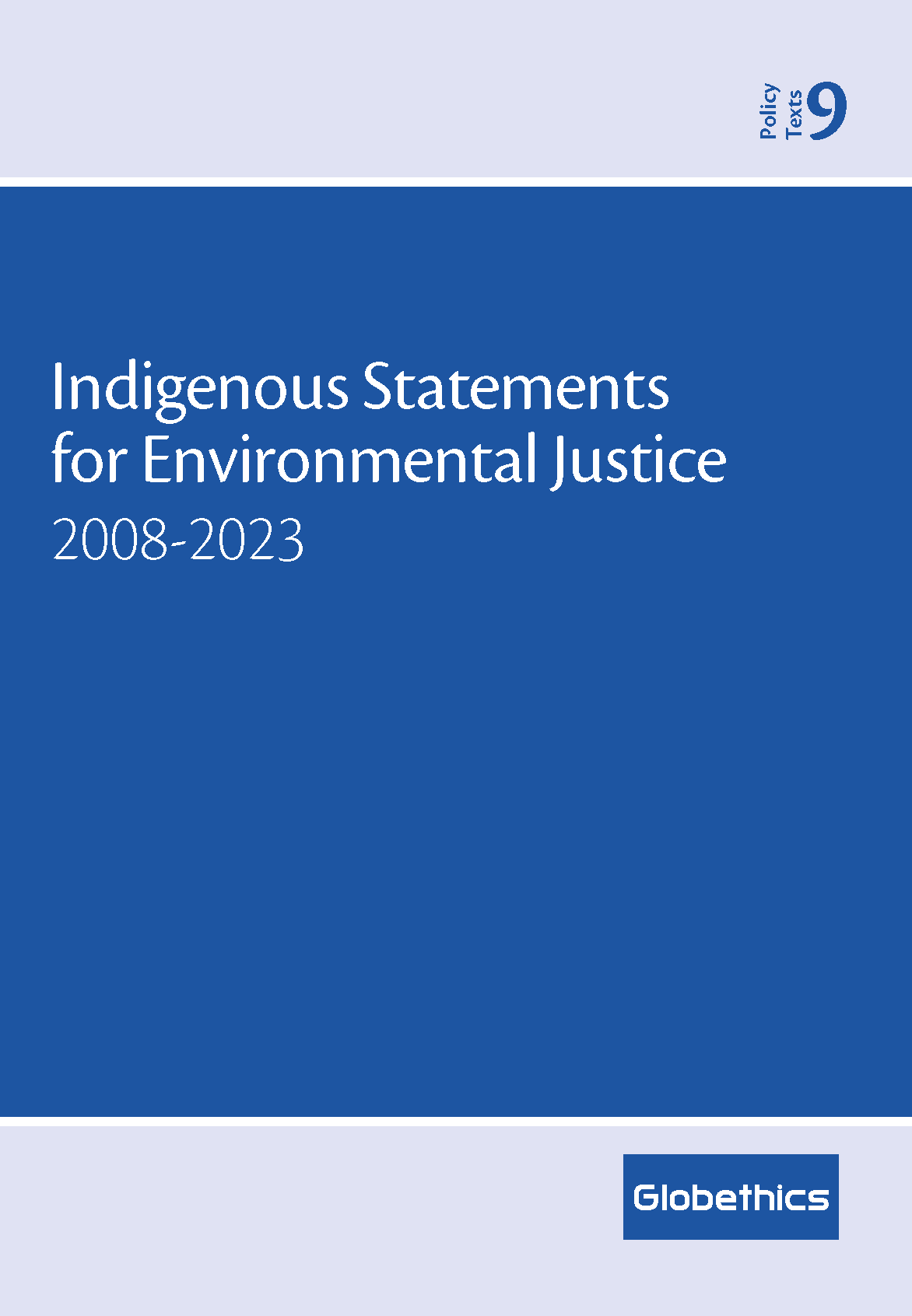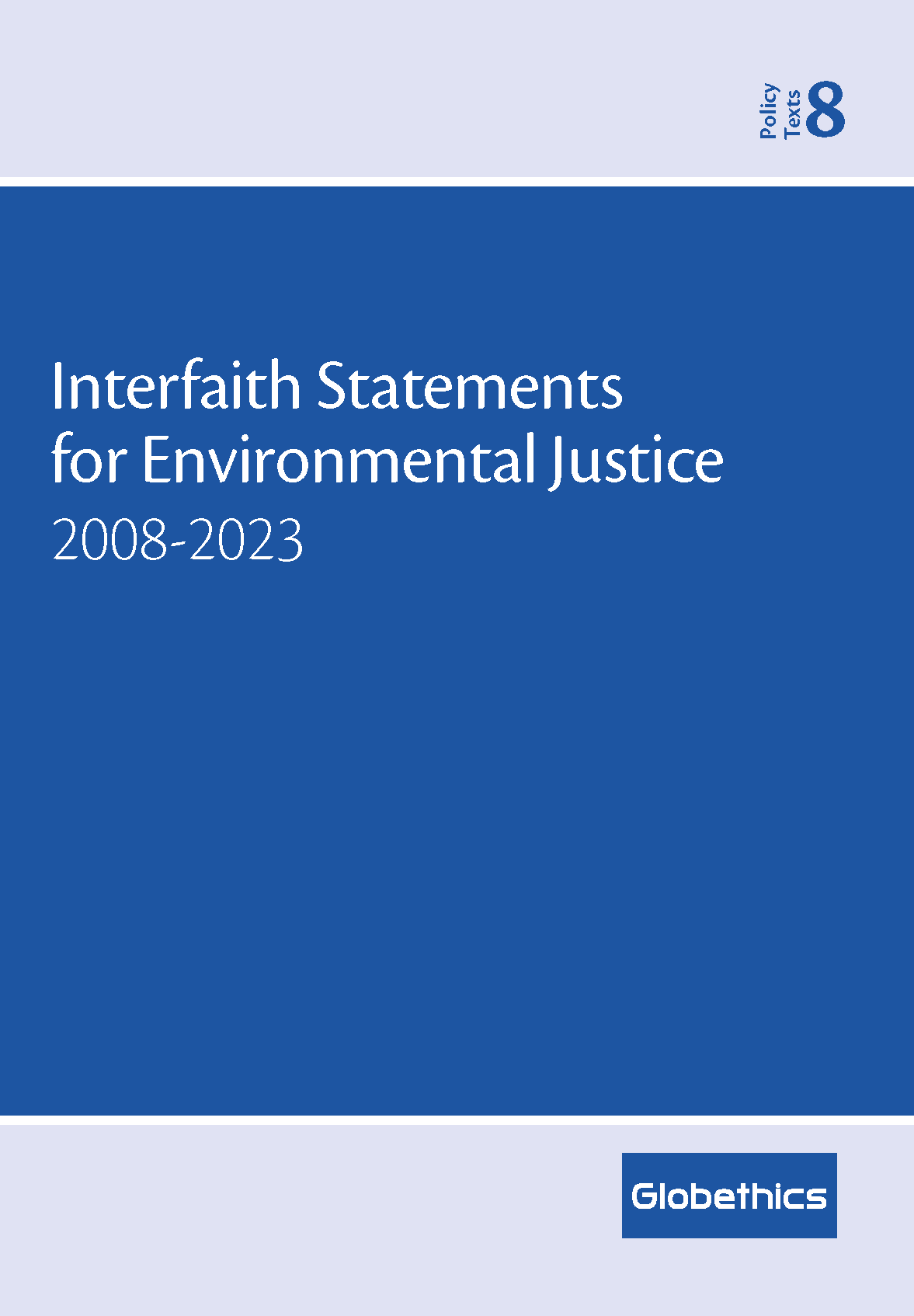Publications: Texts Series
Texts Series
Short statements and recommendations, some adopted by Globethics Advisory Board
Indigenous Statements for Environmental Justice
- Subtitle:
- 2008-2023
- ISBN:
- 978-2-88931-558-1 (online version)
978-2-88931-559-8 (print version) - DOI:
- 10.58863/20.500.12424/4300421
- Series:
- Policy
Texts No. 9 - Publication:
- 2023
- Online copy:
- Download it for free
- Print copies soon available from:
- Amazon.com
- Abstract:
Environmental justice has always been on the agenda of Globethics. In 2014, the organisation decided to amplify religious voices in the sphere, advocating for a global and fair solution, by publishing the book: “Religions for Climate Justice: International Interfaith Statements 2008- 2014”. In 2023, Globethics became more actively engaged in the United Nations Framework Convention on Climate Change (UN-FCCC) and the annual Conference of Parties (COP28) in Dubai, by organising a session entitled: “Listen to those who listen to the earth. A plea for an urgent ethical blue framework by indigenous populations and world religions.” Moreover, Globethics is glad to support the ethical leadership of societal actors, especially indigenous and faith-based actors, by offering to policymakers and the global audience at COP28 and beyond, three open-access volumes including a selection of key messages and statements issued by a) interfaith initiatives, b) indigenous communities, and c) religious actors. In facing the climate crisis, which has become a life and future crisis, all voices are needed. A special attention to indigenous and religious voices is due, since they represent in many cases the voiceless yet most impacted populations, and are heirs of ethical and spiritual wisdom, able to reframe the issue beyond economic and political agendas.
Interfaith Statements for Environmental Justice
- Subtitle:
- 2008-2023
- ISBN:
- 978-2-88931-556-7 (online version)
978-2-88931-557-4 (print version) - DOI:
- 10.58863/20.500.12424/4300420
- Series:
- Policy
Texts No. 8 - Publication:
- 2023
- Online copy:
- Download it for free
- Print copies soon available from:
- Amazon.com
- Abstract:
Environmental justice has always been on the agenda of Globethics. In 2014, the organisation decided to amplify religious voices in the sphere, advocating for a global and fair solution, by publishing the book: “Religions for Climate Justice: International Interfaith Statements 2008- 2014”. In 2023, Globethics became more actively engaged in the United Nations Framework Convention on Climate Change (UN-FCCC) and the annual Conference of Parties (COP28) in Dubai, by organising a session entitled: “Listen to those who listen to the earth. A plea for an urgent ethical blue framework by indigenous populations and world religions.” Moreover, Globethics is glad to support the ethical leadership of societal actors, especially indigenous and faith-based actors, by offering to policymakers and the global audience at COP28 and beyond, three open-access volumes including a selection of key messages and statements issued by a) interfaith initiatives, b) indigenous communities, and c) religious actors. In facing the climate crisis, which has become a life and future crisis, all voices are needed. A special attention to indigenous and religious voices is due, since they represent in many cases the voiceless yet most impacted populations, and are heirs of ethical and spiritual wisdom, able to reframe the issue beyond economic and political agendas.
أخلاقيّات المياه المبادئ والخطوط التوجيهية Water Ethics: Principles and Guidelines
- ISBN:
- 978-2-88931-550-5 (online version)
978-2-88931-551-2 (print version) - DOI:
- 10.58863/20.500.12424/4297753
- Series number:
- النص رقم ٦ Policy
- Publication:
- 2023
- Download it for free:
- Arabic English French Spanish Chinese
- Order print copies (Arabic):
- Amazon.com Amazon.co.uk Amazon.fr Amazon.de
- Abstract:
يرى بعضهم أنّ ما من أهميّةٍ تذكر للآفاق الأخلاقيّة المتصلة بإدارة المياه أو أنّ لا قيمة مضافة لها. بيد أنّ هذا النّص، في تناوله لأخلاقيّات الماء، يدافعُ عن الأطروحة المضادة، ذلك أنّه يستحضرُ القيم والمبادئ الأخلاقية بغية التأثير في القضايا المتّصلة بالمياه وتقديم الحلول الّتي تزيدُ من فرص الأطراف المعنيّة في تحقيق نتائج إيجابيّة. وما من شكّ في أنّ الاعتبارات الأخلاقيّة تلعبُ دوراً هامّا، في طريقة إدارة المياه المتاحة وقيمتها السوقية، على سبيل المثال، بوصفهما مسألتان تتعلقان بالأخلاقيّات الاقتصادية والوصول العادل إلى المياه، أو في ما يتعلقّ بالابتكارات التقنية المتصلة باستخراج المياه ومعالجتها وتزويدها بوصفها جزءاً لا يتجزّأ من أخلاقيّات الابتكار أو في إدارة نزاعات المياه بوصفها مسألة ضرورية لأخلاقيّات السلام أو في تنظيم المياه وإدارتها بوصفها مسألة تتطلّب توفّر أخلاقيّات سياسية أو في طريقة التعاطي مع التقاليد والمعتقدات الدينية، وهو تعاطٍ لا يمكنُ، بأيّ حالٍ من الأحوال، أن يغفل الأخلاقيّات الدينية.
Water Ethics: Principles and Guidelines
- Editors:
- Workshop for Water Ethics (W4W). Endorsed by Globethics.net Board
- ISBN:
- 978-2-88931-312-9
- Series number:
- Globethics.net Text No. 6
- Publication:
- 2019
- Download it for free:
- English French Spanish Chinese Arabic
- Order print copies (English):
- Amazon.com Amazon.co.uk Amazon.fr Amazon.de
- Order print copies (French):
- Amazon.com Amazon.co.uk Amazon.fr Amazon.de
- Order print copies (Spanish):
- Amazon.com Amazon.co.uk Amazon.fr Amazon.de Amazon.es
- Order print copies (Chinese):
- Amazon.com Amazon.co.uk Amazon.fr Amazon.de
- Abstract:
Some would say that ethical perspectives on water management are not important or that they do not bring any added value. This text on water ethics claims the opposite; it brings ethical values and principles to bear on current water issues to provide solutions that improve the chances of positive outcomes for all concerned. Ethical concerns come into play in, for example, managing the availability of water and its market value, as a question of economic ethics and of fair access; technical innovation in relation to extraction, treatment and delivery of water includes innovation ethics; managing water conflicts [...] The text, authored by an international group of experts and approved by the Globethics.net Board of Foundation, shows how ethical values can facilitate the handling of issues and conflicts related to water in an effective, sustainable and inclusive manner. As such the text is a contribution to achieving the United Nations Sustainable Development Goal 6 to ensure availability and sustainable management of water and sanitation for all.




